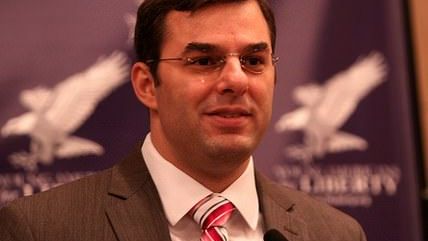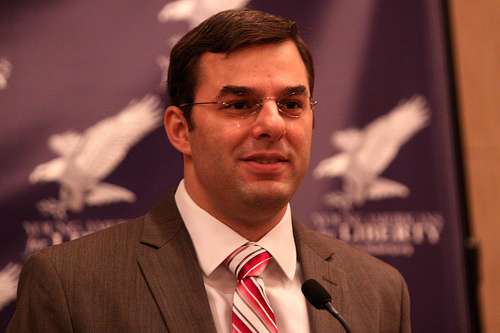Rep. Amash Details How Intelligence Committee Hid Briefings from Conference Members
And then claimed members didn't want to attend


Michigan libertarian Republican Rep. Justin Amash has been hitting at the House Intelligence Committee over access (and the lack thereof) to important classified surveillance documents he and some of his fellow members of Congress are supposed to be able to review.
Last night, he detailed how the Intelligence Committee cleverly made documents briefly available right before Congress' summer recess, but did it in such a way that nobody was likely to be made aware of it in order to make that "we held hearings but nobody came" claim. In short, they didn't actually inform the House members' offices at all, but did the congressional equivalent of posting a hand-written note on the bulletin board of the laundry room.
The Atlantic transcribed part of comments Amash made at the Liberty Political Action Conference in Virginia Thursday:
They sent it through the "Dear Colleague" system. This is a system that, it's almost like a spam folder, frankly. Not everyone in Congress is signed up to it. And basically it's a system where you send letters to your colleagues -- will you cosponsor my bill, will you sign my [unclear], that kind of thing. Normally if you're getting information about an upcoming briefing or an upcoming document that's going to be available to members of Congress, you would get an email. An email, a normal email would come to you, to all members of Congress saying, "Hey there's a document that's going to be available, come stop by." But no, we got it through the "Dear Colleague" system. And the only reasons we noticed is because one of my staffers is silly enough to have this damn folder and look through it and she helped find it and she alerted me, "Hey we've got this document that's going to be available tomorrow, and it's going to be available between 9 a.m. and noon." And it's available between 9 a.m. and noon on the day when members of Congress are leaving to go back to their districts.
So I went back to my colleagues and said, "Hey, did you hear about this briefing with this document?" and they said "No, what are you talking about?" I said there is this notice, we found it, that this document's going to be made available. They said, "We haven't heard of it." I said OK, well come down to the briefing room. They said "OK, if you say so." We grab a few more people.
The only people who showed up at that briefing were the people I talked to. Nobody else knew that that was going on. Not a single person outside of the people I talked to knew that was going on. And we had to sign a disclosure … an anti-disclosure agreement saying we wouldn't talk to any of our colleagues about what we saw.
So the Intelligence Committee did its level best to try to make sure House members didn't know that the document was available for view, and then sent out their spokesperson to say this:
"The House Intelligence Committee makes it a top priority to inform Members about the intelligence issues on which Members must vote. This process is always conducted consistent with the Committee's legal obligation to carefully protect the sensitive intelligence sources and methods that our intelligence agencies use to keep the American people safe. Prior to voting on the PATRIOT Act reauthorization and the FISA Amendments Act reauthorization, Chairman Rogers hosted classified briefings to which all Members were invited to have their questions about these authorities answered.
"It is unfortunate that some of the Members now attacking the Committee chose not to avail themselves of the opportunity back when these programs were not discussed so prominently in the news media."
Read the rest here, where Amash also talks about the insulting 20 questions game they have to play to try to get any information.


Show Comments (11)